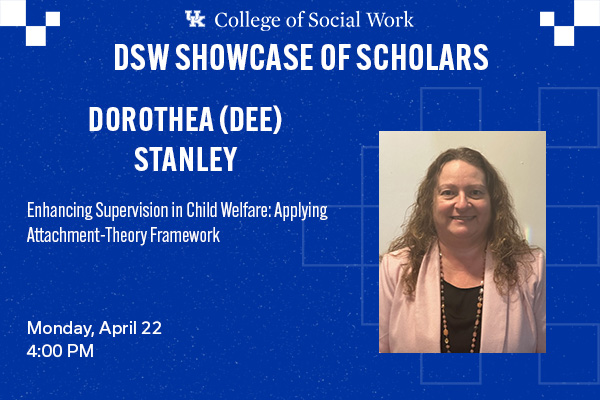DSW Candidate – Dorothea (Dee) Stanley, LISW-S, 4:00 PM – 5:15PM
$0.00
Virtual Showcase of DSW Scholars 2024 Event!
Enhancing Supervision in Child Welfare: Applying Attachment-Theory Framework
Monday, April 22, 2024
4:00 PM – 5:15 PM Eastern Time Zone
Credit Hours: 1.0
Description
Enhancing Supervision in Child Welfare: Applying Attachment-Theory Framework
This presentation explores the crucial role of attachment theory, in particular the secure base model, in the supervision of child welfare workers (CWWs). It focuses on the barriers experienced by CWWs, including secondary trauma and burnout resulting from their interactions with families and children experiencing trauma.
The secure base model, rooted in attachment theory, recognizes the necessity of offering a secure and supportive space for children and caregivers. By encouraging secure attachments between CWWs and supervisors, this presentation argues that supervisors can improve the effectiveness of interventions in the child welfare environment and support the well-being of workers and the families they help.
This presentation explores the consequences of high turnover rates among CWWs and the harmful effects it can have on the continuity of care for at risk children and families. It highlights the significance of retention policies and proposes that applying the secure base model in supervision sessions can contribute to decreasing turnover rates by affording an accommodating environment where workers feel respected and appreciated.
This presentation also outlines real-world strategies for integrating the secure base model in supervision systems within child welfare organizations, including training processes, agency cultural development, and factors for cultural competency. The presentation aims to inform child welfare agencies with the required knowledge to support their workers and improve outcomes for children and families.
Learning Objectives:
- Identify the key factors of the secure base model in the framework of attachment theory and discuss how its relevance to the supervision of child welfare workers in creating emotional safety, professional development, and trust.
- Review the impact of supportive supervision rooted in attachment theory on decreasing secondary trauma and burnout in child welfare workers and examine its value in improving retention rates and role satisfaction in child welfare agencies.
- Create strategies for integrating the secure base model in supervision sessions within child welfare agencies, including training procedures, organizational cultural development, and considerations for cultural competency, with the aim of improving outcomes for vulnerable children and families involved in the child welfare system.
Delivery Method: Live Interactive Training via Zoom Video Conferencing
Credit Hours: 1.0 (ACE)
Target Audience: This conference is intended for social workers and students.
Accreditation: University of Kentucky College of Social Work, Provider # 1377, is approved as an ACE provider to offer social work continuing education by the Association of Social Work Boards (ASWB) Approved Continuing Education (ACE) program. Regulatory boards are the final authority on courses accepted for continuing education credit. ACE provider approval period: 9/29/22-9/29/25. Social workers participating in this conference will receive up to 15 general continuing education credits.
Claiming CE Credit: Instructions for claiming CE credit will be disseminated at the beginning of each session.
Questions: If you have any questions regarding CE credit or to report a grievance, please contact Melissa Whitaker at melissa.whitaker@uky.edu. For technical assistance, please contact lmshelp@uky.edu.
